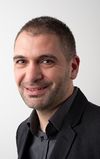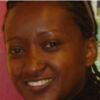Knowledge fuels change
For over a decade, Energypedia has shared free, reliable energy expertise with the world.
We’re now facing a serious funding gap.
Help keep this platform alive — your donation, big or small, truly matters!
Thank you for your support
Difference between revisions of "Webinar Series: Sustainable Energy in Humanitarian Settings"
***** (***** | *****) m |
***** (***** | *****) m |
||
| Line 29: | Line 29: | ||
He joined the ICRC in 2005 and undertook field missions coordinating humanitarian operations in Ethiopia, Pakistan, Palestine, Mauritania, Philippines, Lebanon, South Sudan. He is currently the Knowledge Manger for the ICRC Water and Habitat Unit at Geneva HQ. | He joined the ICRC in 2005 and undertook field missions coordinating humanitarian operations in Ethiopia, Pakistan, Palestine, Mauritania, Philippines, Lebanon, South Sudan. He is currently the Knowledge Manger for the ICRC Water and Habitat Unit at Geneva HQ. | ||
| + | |- | ||
| + | | [[File:Florent Eveille - picture.jpg|border|center|100px|link=]] | ||
| + | | <br/> | ||
| + | | '''Florent Eveillé, Food and Agriculture Organization of the United Nations (FAO)''' | ||
| + | Florent Eveillé coordinates the Safe Access to Fuel and Energy approach within and outside of FAO. Before ensuring this role, he worked for the FAO Office in West Bank & Gaza Strip. With a background in Natural Resources Management and Economics, Florent has covered different roles in the field of resilience, nature conservation, renewable energy and waste management in Central African Republic, France, Jordan, Lebanon and at EU level. | ||
|- | |- | ||
| [[File:Thomas Fohgrub.jpg|border|center|100px|link=]] | | [[File:Thomas Fohgrub.jpg|border|center|100px|link=]] | ||
Revision as of 22:04, 10 June 2019
|
Webinar Series: Sustainable Energy in Humanitarian Settings - Knowledge and Solutions from and for the field - |
Today, over 130 million people are in need of humanitarian assistance due to conflict, natural disasters, and other complex global challenges. For many of these people, access to energy sources is critical for survival, and how they access it impacts their health, livelihoods, safety, and well-being.
Energy access for displaced people is not prioritized in the global humanitarian system. Current energy practices in situations of displacement are often inefficient, polluting, unsafe for users, and harmful to the surrounding environment. Moreover, institutional humanitarian operations such as water pumping, community lighting, and health clinics rely heavily on unsustainable fossil fuels, costing hundreds of millions of dollars annually. Given the complex nature of humanitarian response and the challenges of integrating sustainable energy solutions into the humanitarian program cycle, there is not just one solution but a need for systemic actions to mobilise resources, build capacity and use the opportunity for sustainable energy solutions to enhance impact in sectors such as health, protection, food security, and WASH. read more
Against this background, key actors involved in displacement settings developed in 2018 the Global Plan of Action for Sustainable Energy Solutions in Situations of Displacement (GPA). It’s mission is to equip stakeholders with the capacity to mainstream sustainable energy solutions into programming, with the goal of delivering improved protection, dignity, and energy-related social, environmental, and economic benefits to displaced people.
As part of the outreach and capacity building activities of this movement, the International Committee of the Red Cross (ICRC) together with the Steering Group of the GPA and other partners are conducting a series of webinars on humanitarian energy issues to raise awareness and spread knowledge about different technologies, best practices and impacts.
1st Webinar
State of Play: Sustainable Energy in Humanitarian Settings
Tuesday, 25 June 2019 at 14:00 CEST
Registration Link: https://attendee.gotowebinar.com/register/5989993512099607308
The webinar will provide a comprehensive picture of the state of the art in the humanitarian sector. It will also present energy linkages with other humanitarian agendas, a framework for the energy transition, and a stakeholder overview.
Speakers
 |
Marco Albertini, International Committee of the Red Cross (ICRC)
With a background in Environmental Engineering and Business Administration, Marco has 15 years of international experience in team coordination and project management in the fields of water and power supply and rehabilitation of infrastructures for essential services. He joined the ICRC in 2005 and undertook field missions coordinating humanitarian operations in Ethiopia, Pakistan, Palestine, Mauritania, Philippines, Lebanon, South Sudan. He is currently the Knowledge Manger for the ICRC Water and Habitat Unit at Geneva HQ. | |
 |
Florent Eveillé, Food and Agriculture Organization of the United Nations (FAO)
Florent Eveillé coordinates the Safe Access to Fuel and Energy approach within and outside of FAO. Before ensuring this role, he worked for the FAO Office in West Bank & Gaza Strip. With a background in Natural Resources Management and Economics, Florent has covered different roles in the field of resilience, nature conservation, renewable energy and waste management in Central African Republic, France, Jordan, Lebanon and at EU level. | |
 |
Thomas Fohgrub, United Nations Institute for Training and Research (UNITAR)
Thomas is the head of the Coordination Unit for the Global Plan of Action for Sustainable Energy Solutions in Situations of Displacement, which is hosted at the United Nations Institute for Training and Research and is steered by 13 key organizations from humanitarian aid and development assistance. He is working within UNITAR at this topic since two years. Before that, Thomas was for more than 4 years the focal point for trade and development, economic cooperation and sustainable energy at the German Mission to the UN in Geneva and served in other capacities for the German Ministries of Energy and Social Affairs before. He holds an MA in European Studies and a PhD in Management Consulting. | |
 |
Sergio Gelli, International Committee of the Red Cross (ICRC)
Sergio Gelli works for the International Committee of the Red Cross- ICRC, as the Energy Initiatives Senior Advisor to the Board of Directors. | |
 |
Madeleine Marara, Office of the United Nations High Commissioner for Refugees (UNHCR)
Madeleine Marara, who has more than 10 years of mix-experience in the humanitarian, development and academic sectors, currently works at the Headquarters of the UN Refugee Agency (UNHCR), as an associate project officer, within the Energy and Environment Unit. Prior to joining UNHCR headquarters, she has worked in the field with UNHCR Rwanda Operation, where she developed the country SAFE (Safe Access to fuel and Energy) Strategy and managed its implementation. Her other work experience include work in the development sector, mainly in WASH, Environment and sustainable energy solutions in remote areas. Miss. Marara holds a BSc. Degree in civil engineering from KIST, Kigali - Rwanda and a MSc. degree In Environmental Sciences from IHE, Delft-The Netherlands. |
2nd Webinar
Stay tuned for details!
3rd Webinar
Stay tuned for details!
4th Webinar
Stay tuned for details!
<headertabs></headertabs>
Organizers




















